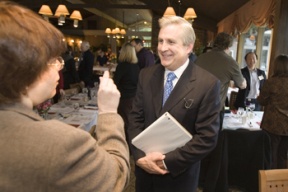After a rough six months, things should pick up, an analyst says.
Chin up. Keep spending.
The beginning might be bumpy, but the backside of 2007 looks smooth.
That, roughly translated, was the message offered by financial guru Tom Cox to a bevy of Bainbridge business brains gathered at Wing Point Country Club Wednesday for the Bainbridge Island Chamber of Commerce’s annual economic forecast luncheon.
“While things might be tough for the first six months,” Cox said, “people are somewhat optimistic about the rest of the year.”
About 90 people gathered to hear Cox, host of the the television show “Smart Money,” along with a panel of three local businesspeople, share their views about the coming year.
Cox said the housing market, which has in recent years seen prices jump by as much as 20 percent, would likely level off to its more traditional 5 percent annual increase. He also expects the skyrocketing price of building materials to stabilize, a prediction that could bode well for local construction projects like the new high school renovation.
The rising prospects of local companies like Boeing and Microsoft, which Cox has in recent years shied away from, was also cited as a plus.
The technology sector in particular looks strong and is generating the bulk of the state’s new, well-paying jobs. He backed his point by referencing the difference between the state’s available tech jobs now (44,000) compared to 1990 (7,000).
On the down side, there appears to be a shortage of qualified labor. That jibed with a recent Chamber survey, in which a majority of Bainbridge business owners cited a scarcity of qualified help as their number one concern.
“It’s unusually low,” Cox said. “It’s hard to get the people you really want.”
Overall, Cox predicts steady economic growth, despite the fears of some that the country is in danger of slipping into a recession.
He predicts local growth as well.
“People want to live here on Bainbridge Island because it’s a beautiful place,” he said.
Statistics, offered by Bainbridge realtor Lois Boubong, backed Cox’s assessment.
At $661,000, the island’s median home price jumped 16 percent in 2006. An inventory of new units sent condo prices down by 26 percent, to $302,500.
“Last year was a no-brainer,” she said. “The market was flying.”
This year, though, most realtors expect a slow start and a strong finish. She said that although the Puget Sound region remains better off than many others in the country, it is difficult to assess how markets elsewhere will impact sales locally.
People looking to move to Bainbridge, for example, may have trouble selling their old home if it’s in a struggling market.
David Nelson, of Windermere, highlighted a slew of new retail space coming online at a number of mixed-use projects around Winslow. That, he said, explains higher vacancy rates of late. He also expects that trend to continue as developers look to replace older buildings with condo and retail space.
Sherri Watson, manager of the Day Road Business Park, said projects like the new Sportsman Park Business Complex are allowing growing businesses to stay on the island.
But the bulk of the spotlight shone on Cox, who presented attendees with his seven rules of investing. He recommends an “easy, lazy, properly diversified” portfolio of mutual funds that you can build and forget. He also said it’s a good idea to invest half of your money internationally.
Some, he said, wonder how long the bull market, in its fifth year, will continue. He encouraged people to keep investing and, most importantly, to not believe everything they hear.
“There’s a lot of noise out there that causes us all to be lousy investors,” he said. “If you listen to all the things people say and then run out and act on it, you’re going to make a bad investment.”



